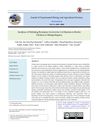 August 2023 in “JOJ dermatology & cosmetics”
August 2023 in “JOJ dermatology & cosmetics” Antibiotics often cause skin reactions, making them a major health concern.

COVID-19 can cause skin problems and affect dermatology treatments, with recommendations for skin care and cautious use of certain drugs.
 February 2023 in “Asian journal of pharmaceutical research and development”
February 2023 in “Asian journal of pharmaceutical research and development” Flavonoids in Iraqi marshland plants have potential health benefits like antioxidant and anti-inflammatory effects.
 January 2023 in “International Journal of Research Publication and Reviews”
January 2023 in “International Journal of Research Publication and Reviews” Some herbal ingredients like linalool and tea tree oil have anti-dandruff properties and are safe for use in shampoos.
 January 2023 in “European endocrinology”
January 2023 in “European endocrinology” People with alopecia have a higher risk of thyroid cancer.
 August 2022 in “International Journal of Health Sciences (IJHS) (En línea)”
August 2022 in “International Journal of Health Sciences (IJHS) (En línea)” Oxidative stress is important in causing alopecia areata.
 June 2022 in “Journal of Experimental Biology and Agricultural Sciences”
June 2022 in “Journal of Experimental Biology and Agricultural Sciences” Most E. coli in broiler chickens are resistant to multiple antibiotics.
 May 2022 in “Gastroenterology”
May 2022 in “Gastroenterology” Targeting NETs may help reduce fibrosis in Crohn's disease.
 October 2021 in “The Egyptian Journal of Hospital Medicine”
October 2021 in “The Egyptian Journal of Hospital Medicine” Alopecia areata causes patchy hair loss and involves immune system disruptions.

Tacrolimus causes fewer acute rejections than cyclosporin A in kidney transplants but doesn't necessarily improve kidney function after one year; cardiovascular risks and side effects vary between the two drugs.

Lamivudine might reverse hair graying and needs more research for potential treatments.
 January 2020 in “Der Pharmacia Lettre”
January 2020 in “Der Pharmacia Lettre” Nanoparticle-based herbal remedies could be promising for treating hair loss with fewer side effects and lower cost, but more research is needed.
 October 2018 in “InTech eBooks”
October 2018 in “InTech eBooks” The most effective treatments for hair loss are minoxidil, finasteride, PRP, and hair transplants, with steroids and immunosuppressants for autoimmune types.
 July 2018 in “Elsevier eBooks”
July 2018 in “Elsevier eBooks” Some drugs can cause reversible hair loss, but certain chemotherapy drugs may lead to permanent hair loss; drugs can also change hair color and texture.

Alopecia Areata is treated with drugs and therapies to reduce inflammation and immune response.

Botulinum toxin type A significantly reduces scalp psoriasis severity compared to placebo.
 April 2016 in “Annals of laboratory medicine”
April 2016 in “Annals of laboratory medicine” The method reliably profiles eicosanoids and shows epitestosterone reduces their levels, similar to common anti-inflammatory drugs.
 April 2015 in “Andrology”
April 2015 in “Andrology” HNG may help prevent the negative effects of chemotherapy on sperm production and white blood cell counts.
 September 2014 in “Aktuelle Dermatologie”
September 2014 in “Aktuelle Dermatologie” The symposium concluded that environmental factors significantly contribute to skin aging.
 January 2014 in “Journal of Investigative Dermatology”
January 2014 in “Journal of Investigative Dermatology” Proteins like aPKC and PDGF-AA, substances like adenosine and ATP, and adipose-derived stem cells all play important roles in hair growth and health, and could potentially be used to treat hair loss and skin conditions.

Wound healing is complex and requires more research to enhance treatment methods.
 January 2012 in “Springer eBooks”
January 2012 in “Springer eBooks” Lupus can cause different skin problems, and treatments like quitting smoking and using certain creams or medicines can help.
 October 2003 in “Journal of Investigative Dermatology Symposium Proceedings”
October 2003 in “Journal of Investigative Dermatology Symposium Proceedings” Mice treatments didn't grow hair, a patient treatment may affect immune response, and people with hair loss often feel anxious or depressed.
 April 2003 in “Experimental Dermatology”
April 2003 in “Experimental Dermatology” The workshop highlighted the genetic links and psychological impacts of hair loss and skin disorders.
 September 1997 in “JEADV. Journal of the European Academy of Dermatology and Venereology/Journal of the European Academy of Dermatology and Venereology”
September 1997 in “JEADV. Journal of the European Academy of Dermatology and Venereology/Journal of the European Academy of Dermatology and Venereology” Psychological factors play a significant role in developing alopecia areata.
 May 1991 in “Current problems in dermatology”
May 1991 in “Current problems in dermatology” Skin issues can indicate immune system problems.
 January 2016 in “Springer eBooks”
January 2016 in “Springer eBooks” New materials and methods could improve skin healing and reduce scarring.
 October 2020 in “Journal of Pakistan Association of Dermatology”
October 2020 in “Journal of Pakistan Association of Dermatology” Platelet-rich plasma therapy is more effective than minoxidil lotion for increasing hair count in men with hair loss, with mild side effects and high satisfaction.
 September 2023 in “The FASEB journal”
September 2023 in “The FASEB journal” Foxn1 is important for fat development, metabolism, and wound healing in skin.
 January 2024 in “Journal of Evidence-Based Integrative Medicine”
January 2024 in “Journal of Evidence-Based Integrative Medicine” Teak leaf extract may effectively and safely promote hair growth in males with androgenic alopecia.






























